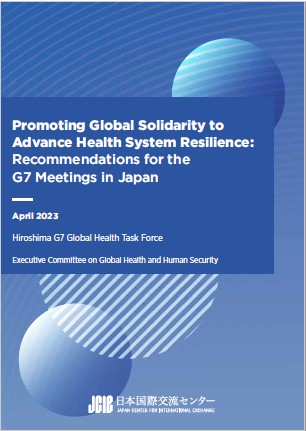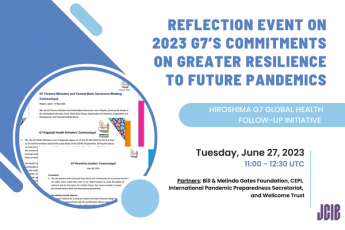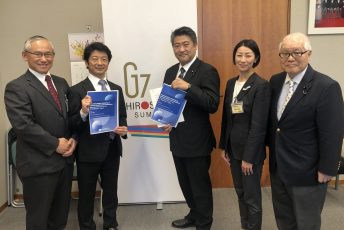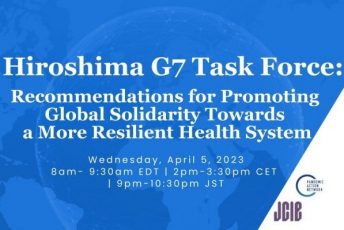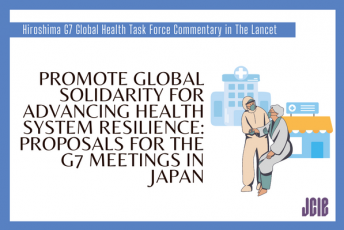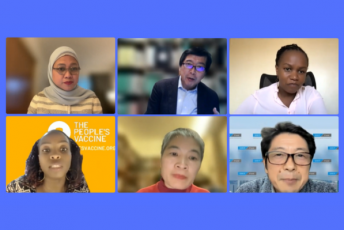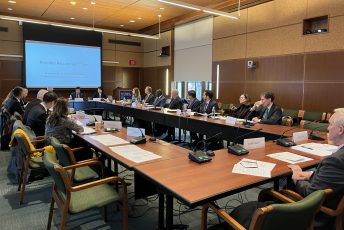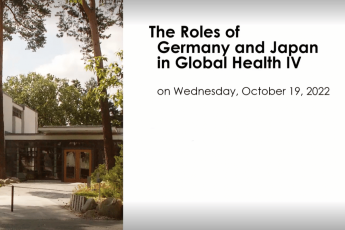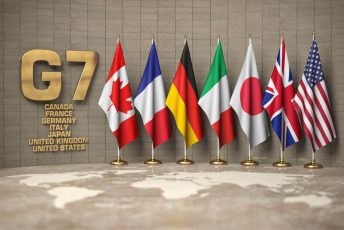Hiroshima G7 Global Health Task Force
2022–2023
In 2023, Japan hosts the G7 Summit in Hiroshima, the “City of Peace.” Ahead of the Summit, in July of 2022 JCIE established the Hiroshima G7 Global Health Task Force under the Executive Committee on Global Health and Human Security (Chairman: Keizo Takemi, Member of the House of Councillors; Executive Director: Akio Okawara, President and CEO, JCIE) to make recommendations to the Japanese government on the G7 agenda and concrete measures to be promoted for global health in the context of the rapidly changing global health architecture. Research teams were created to examine the three major themes, and the Task Force organized several international dialogues that engaged representatives from diverse sectors across G7 and non-G7 countries.
In April 2023, the Task Force released its recommendations and key action points for the 2023 G7. Through these efforts, the Task Force seeks to reaffirm Japan’s position in the ever-changing international community, identify areas where Japan should lead as the 2023 G7 chair, and explore specific measures to pursue even beyond the 2023 G7 Summit.
TASK FORCE NEWS
Hiroshima G7 Global Health Task Force Recommendations for the G7 Meetings in Japan
|
Hiroshima G7 Task Force: Recommendations for Promoting Global Solidarity Towards a More Resilient Health System
|
JCIE's Hiroshima G7 Global Health Task Force Publishes Comments in the Lancet Ahead of G7 Meetings
|
Hiroshima G7 Global Health Task Force Dialogue Series
|
Hiroshima G7 Global Health Taskforce Roundtable Discussion
|
The Roles of Germany and Japan in Global Health IV
|
Launch of the G7 Global Health Task Force
|
Background
The 2023 G7 Summit will be held on May 19–21 in Hiroshima, Japan. The invasion of Ukraine by Russia, a permanent member of the UN Security Council, has raised many issues for the current international framework, and Japan must rebuild its diplomatic power and consider how it can contribute to the realization of a peaceful and stable international community. Global health is an important theme that could become a key pillar as Japan reestablishes its diplomatic capacity.
In the field of global health, the global spread of the COVID-19 pandemic has made the link between health and society, the economy, and security even clearer than before, and beyond just the health sector, it has indicated the need for commitment and leadership at the head-of-state level. In addition, it has spurred an active discussion in the international community on how to enhance the response for and preparedness to health crises, including pandemics.
On May 24, 2022, Japan announced its Global Health Strategy. The strategy includes the following as its major goals: (1) to contribute to developing a resilient global health architecture for prevention, preparedness, and response (PPR) to public health crises, including pandemics; and (2) to realize human security by accelerating the efforts to achieve more resilient, equitable, and sustainable Universal Health Coverage (UHC), a necessary goal in the new era post-COVID. A summary of the Global Health Strategy strategy can be found here.
The “G7 Ise-Shima Vision for Global Health,” which was approved during the 2016 summit hosted by Japan, identified achieving UHC and responding to health crises as the “two wheels of the cart.” This policy framework has become even more relevant now in light of the COVID-19 experience. Moreover, given Japan’s advocacy for sustainable UHC and its role in placing population aging on the G20 agenda for the first time at the 2019 G20 Osaka Summit, supporting preparedness that reflects the world’s demographic shifts and changes in epidemiological structures is another issue that Japan should pursue.
This Task Force is being convened by JCIE’s Executive Committee on Global Health and Human Security, a unique public-private platform established in 2007 that facilitates the Japanese government’s policymaking on global health and public-private collaboration in that field. The committee similarly convened a working group to make recommendations in the lead-up to the 2016 G7 Summit.
MAIN THEMES
1. 100 Days Mission and Access & Delivery (100 Days Mission PLUS)
2. Resilient, Equitable, and Sustainable UHC
3. Global Health Architecture Development
Director
HIDEAKI SHIROYAMA, Professor, Graduate School of Public Policy and Graduate School of Law and Politics, University of Tokyo; Director, Institute for Future Initiatives, The University of Tokyo
Deputy Directors
HIROKI NAKATANI, Visiting Professor, Faculty of Medicine, Keio University; Advisor for International Affairs, Ministry of Health, Labour and Welfare (MHLW); Member, WHO Executive Board
OSAMU KUNII, Executive Director and CEO, GHIT Fund (Chair, 100 Days Mission PLUS )
KAYO TAKUMA, Professor, Faculty of Law, Tokyo Metropolitan University (Chair, Global Health Architecture Group)
Japan Working Group
KEISHI ABE, Senior Fellow, Institute for Policy Studies, National Graduate Institute for Policy Studies
SARAH KRULL ABE, Section Head, Division of Prevention, National Cancer Center Institute for Cancer Control (Scientific Coordinator)
TAKANORI FUJITA, Project Lead of Healthcare Data Project, World Economics Forum Centre for the Forth Industrial Revolution Japan
CHIEKO IKEDA, Director General, Bureau of International Health Cooperation, National Center for Global Health and Medicine (UHC Chair)
MASAKI INABA, Co-Chair, Africa Japan Forum; Chair, Japan CSO Network on Global Health
KAZUAKI JINDAI, Assistant Professor, Graduate School of Medicine, Tohoku University
MIHOKO KASHIWAKURA, Head of Japan, Bill & Melinda Gates Foundation
NAOKI KONDO, Professor, Department of Social Epidemiology, Graduate School of Medicine, Kyoto University
MAKIKO MATSUO, Project Associate Professor, Graduate School of Public Policy, The University of Tokyo
YOSHITAKA NISHINO, Research Associate, JCIE/Japan (Assistant Coordinator)
SHUHEI NOMURA, Associate Professor, Department of Health Policy and Management, Keio University School of Medicine
HARUKA SAKAMOTO, Associate Professor, Department of Hygiene and Public Health, Tokyo Women’s Medical University
TOMOKO SUZUKI, Chief Program Officer, JCIE/Japan (Chief Coordinator)
AYAKO TAKEMI, Associate Professor, Research Center for Advanced Science and Technology, The University of Tokyo
※We are also requesting cooperation from relevant ministries and agencies
International Advisors
LAV AGARWAL, Additional Secretary, Ministry of Health and Family Welfare, Government of India
MANICA BALASEGARAM, Executive Director, GARDP
SETH BERKLEY, CEO, Gavi, the Vaccine Alliance
JOE CERRELL, Managing Director for Europe, the Middle East, and East Asia (EMEEA), Bill & Melinda Gates Foundation
AWA MARIE COLL-SECK, Minister of State to the President of the Republic of Senegal
THOMAS B. CUENI, Director General, International Federation of Pharmaceutical Manufacturers & Association (IFPMA)
MANDEEP DHALIWAL, Director, HIV, Health and Development Group, Bureau for Policy and Programme Support, United Nations Development Programme (UNDP)
ALAN DONNELLY, Conenor, G20 Health & Development Partnership
PHILIPPE DUNETON, Executive Director, Unitaid
MARK DYBUL, Faculty Co-Director, Center for Global Health and Quality, and Professor, Department of Medicine, Georgetown University Medical Center
VICTOR DZAU, President, National Academy of Medicine (NAM), USA
JEREMY FARRAR, Director, Wellcome Trust
RICHARD HATCHETT, CEO, Coalition for Epidemic Preparedness Innovations (CEPI)
RICHARD HORTON, Editor-in-Chief, the Lancet
ABOUBACAR KAMPO, Director of Health, Programme Group, United Nations Children’s Fund (UNICEF)
NATALIA KANEM, Executive Director, United Nations Population Fund (UNFPA)
ILONA KICKBUSCH, Founder, Global Health Centre at Graduate Institute of International & Development Studies in Geneva
JUSTIN KOONIN, Co-chair, Steering Committee, UHC2030
ROSEMARY MBURU, Executive Director, WACi Health, Kenya
KHUAT THI HAI OANH, Executive Director, Center for Supporting Community Development Initiatives, Vietnam
FRANCIS GERVASE OMASWA, Executive Director, African Centre for Global Health and Social Transformation
SCOTT PENDERGAST, Director, Health Emergencies Strategy, Programmes and Partnerships, World Health Organization (WHO)
PETER PIOT, Special Advisor on COVID-19 to the President, EU Chief Scientific Advisor Epidemics, Cabinet of Ursula Von Der Leyen, President of the European Commission
MICHAEL R. REICH, Takemi Professor of International Health Policy, Emeritus, Harvard T.H. Chan School of Public Health
CATHERINE RUSSELL, Executive Director, UNICEF
PETER SANDS, Executive Director, the Global Fund to Fight AIDS, Tuberculosis and Malaria
DIAH SATYANI SAMINARSIH, Founder and CEO, Center for Indonesia’s Strategic Development Initiatives (CISDI); Former Senior Advisor on Gender and Youth to WHO Director General
KENJI SHIBUYA, Research Director, The Tokyo Foundation for Policy Research
JUAN PABLO URIBE, Global Director for Health Nutrition and Population, World Bank; Director, Global Financing Facility for Women, Children and Adolescents (GFF)
PATRICK VALLANCE, Government Chief Scientific Adviser, UK
WALAIPORN PATCHARANARUMOL, Director, Global Health Division, Ministry of Public Health; Secretary General, IHPP Foundation
NAOKO YAMAMOTO, Appointed Professor, International University of Health and Welfare
ROBERT YATES, Director, Global Health Programme; Executive Director, Centre for Universal Health, Chatham House
- Hiroshima G7 Global Health Taskforce Roundtable Discussion
- The Roles of Germany and Japan in Global Health IV
- Hiroshima G7 Global Health Task Force Dialogue Series
Many thanks also to the following for their insights:
- Damiano De Felice, Director of Development and External Engagement, CARB-X
- Global Health Security Consortium
- Heulwen Philpot, Head of Secretariat, International Pandemic Preparedness Secretariat (IPPS)
- Soumya Swaminathan, former WHO Chief Scientist
- The Joint United Nations Programme on HIV/AIDS (UNAIDS)
- World Economic Forum Regional Vaccine Manufacturing Collaborative
- WHO Hub for Pandemic and Epidemic Intelligence (the WHO Pandemic Hub)

